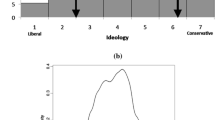Abstract
This article examines the behavior of voters who decide on their presidential candidate preferences within the final two weeks of the presidential campaigns. Relying on data from American National Election Studies (ANES) for elections, between 1972 and 1988, we demonstrate that late deciders are different from other voters in a variety of respects. They are less involved politically and far less predictable in their behavior than other voters. More significantly, we find that the candidate preferences of late deciders are not determined by the conventional political forces that motivate other voters. Rather, the choices that late deciders make appear to be nearly random in character. The implications of these findings for the analysis of electorates are discussed.
Similar content being viewed by others
References
Abramson, Paul, Ostrom, Charles (1991). Macropartisanship: An empirical reassessment.American Political Science Review 85: 181–192.
Barton, Allen, and Parsons, Wayne 1977. Measuring belief system structure.Public Opinion Quarterly 41: 159–180.
Berelson, Bernard, Lazarsfeld, Paul, and McPhee, William 1954.Voting. Chicago: University of Chicago Press.
Brody, Richard, and Rothenberg, Lawrence 1988. The instability of partisanship: An analysis of the 1980 presidential election.British Journal of Political Science 18: 445–465.
Campbell, Angus, Converse, Philip, Miller, Warren, and Stokes, Donald (1960).The American Voter. Chicago: University of Chicago Press.
Chaffee, Steven, and Choe, Sun Yuel (1980). Time of decision and media use during the Ford-Carter campaign.Public Opinion Quarterly 44: 53–69.
Green, Donald, and Palmquist, Bradley (1990). Of artifacts and partisan instability.American Journal of Political Science 34: 872–902.
Hofstetter, C. Richard, and Buss, Terry (1980). Politics and last-minute political television.Western Political Quarterly 33: 25–37.
Kelley Stanley (1983).Interpreting Elections. Princeton, NJ: Princeton University Press.
Kelley, Stanley, and Mirer, Thad (1974). The simple act of voting.American Political Science Review 68: 572–591.
Kenney, Patrick, and Rice, Tom (1988). Presidential prenomination preferences and candidate evaluations.American Political Science Review 82: 1309–1320.
Lazarsfeld, Paul, Berelson, Bernard, and Gaudet, Hazel (1948).The People's Choice, 2nd ed. New York: Columbia University Press.
Luskin, Robert (1987). Measuring political sophistication.American Journal of Political Science 31: 856–899.
Markus, Gregory (1982). Political attitudes during an election year: A report on the 1980 NES panel study.American Political Science Review 76: 538–560.
Miller, Warren (1991). Party identification, realignment, and party voting: Back to the basics.American Political Science Review 85: 557–568.
Plumb, Elizabeth (1986). Validation of voter recall: Time of electoral decision making.Political Behavior 8: 302–312.
Riker, William, and Ordeshook, Peter (1973).An Introduction to Positive Political Theory. Englewood Cliffs, NJ: Prentice-Hall.
Southwell, Priscilla (1986). The politics of disgruntlement: Nonvoting and defection among supporters of nomination losers.Political Behavior 8: 81–95.
Stone, Walter (1986). The carryover effect in presidential elections.American Political Science Review 80: 271–280.
Wyckoff, Mikel (1980). Belief system constraint and policy voting: A test of the unidimensional consistency model.Political Behavior 2: 115–145.
Rights and permissions
About this article
Cite this article
Gopoian, J.D., Hadjiharalambous, S. Late-deciding voters in presidential elections. Polit Behav 16, 55–78 (1994). https://doi.org/10.1007/BF01541642
Issue Date:
DOI: https://doi.org/10.1007/BF01541642




